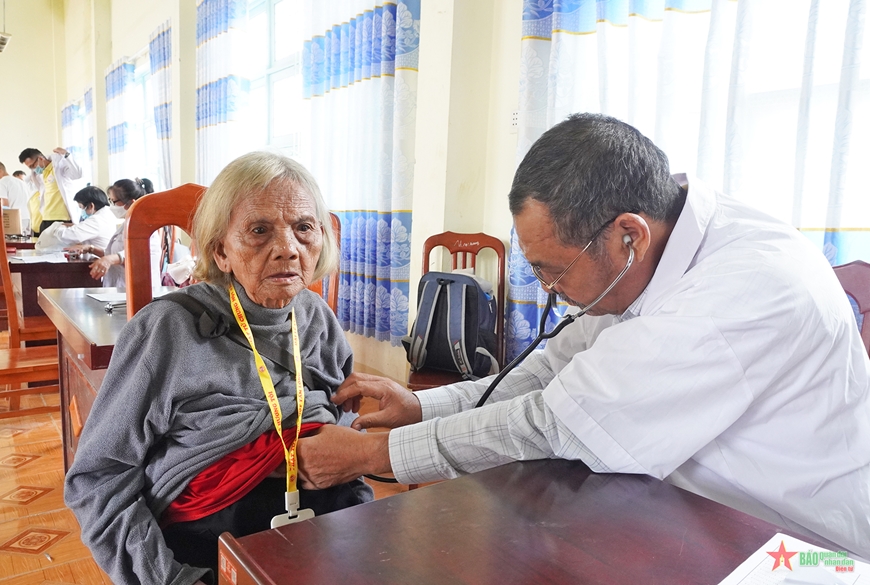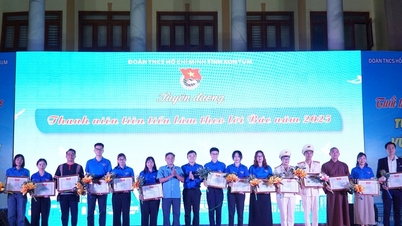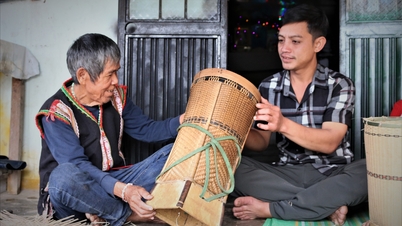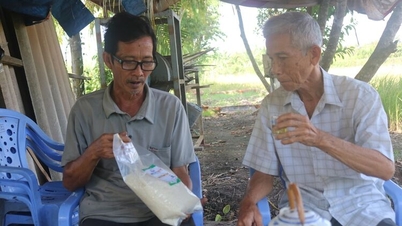In order to achieve the goal of taking care of people's health, improving the physical condition and stature of ethnic minorities; preventing child malnutrition (Project 7) in the National Target Program on Socio-Economic Development in Ethnic Minorities and Mountainous Areas for the period 2021-2030, for many months now, Kon Tum Eye Hospital has coordinated with the Elderly Association to regularly visit ethnic minority villages to organize free eye disease screening for people. This makes people very excited.
Along with going to ethnic minority villages to screen people for eye diseases, doctors at Kon Tum Eye Hospital also give free medicine to people for common diseases. In cases of serious illness or complicated pathology, they advise and guide people to go to medical facilities for timely treatment.
In particular, through the process of going directly to the place for screening examination, doctors at Kon Tum Eye Hospital realized that the majority of elderly people in ethnic minority areas have never been to medical facilities for examination and treatment of eye diseases. The subjects with eye pain and eye diseases often fall into the poor, those who cannot afford to go for treatment.
Therefore, to support patients in treating eye diseases, from now until 2025, Kon Tum Eye Hospital will implement a 100% free eye surgery program for people in difficult circumstances and ethnic minorities in the whole province. In addition, all children with eye defects in difficult circumstances will also receive 100% free surgery, regardless of the payment percentage of the Health Insurance card.

More than 2,000 people in Tu Mo Rong district received gifts and free medical examinations. Photo: QĐND Newspaper
Previously, in early October 2023, implementing the project of taking care of people's health, improving the health and stature of ethnic minorities within the framework of the National Target Program on socio-economic development in ethnic minority and mountainous areas for the period 2021 - 2030, phase I: From 2021 to 2025, on October 7, Tu Mo Rong district (Kon Tum province) coordinated with volunteer groups in Ho Chi Minh City to organize a volunteer program for community health and support children to go to school, give gifts, and examine thousands of people in the area.
In addition, the doctors in the volunteer group also organized medical examinations and provided free medicine to hundreds of people in need of policy families, meritorious people, poor people, and people with disabilities in Tu Mo Rong district; organized haircuts, "Zero-dong booths" and other volunteer activities to serve the people....
“The district’s invitation to charity groups to give gifts and provide medical examinations and treatment this time is also aimed at taking care of the younger generation and the people’s health. Through the program, the district hopes that children will have better learning conditions, while people will be examined and treated by highly qualified doctors, helping to ensure their health. It is estimated that about 2,000 people in the area will benefit from this program. This is the largest charity program the district has ever called for,” said Vo Trung Manh, Chairman of the Tu Mo Rong District People’s Committee.
These are two of many health care activities for ethnic minorities that Kon Tum province has paid great attention to in recent times and has achieved many positive results. Ethnic minorities have more opportunities to access health care.
In order to continue implementing the goals and tasks of developing human resources for ethnic minorities according to Resolution No. 52/NQ-CP dated June 15, 2016 of the Government in conjunction with the effective implementation of policies, projects, and sub-projects on developing education and training to improve the quality of human resources; developing vocational education and creating jobs for workers in ethnic minority and mountainous areas under the National Target Program on Socio-Economic Development in Ethnic Minorities and Mountainous Areas for the 2021-2030 period, Kon Tum province considers improving the health and physical condition of ethnic minority human resources as a long-term strategic issue, associated with the strategy on ethnic affairs, ethnic policies, and the diverse and comprehensive development of the cultural, material and spiritual life of ethnic minorities in the locality.
The province aims to maintain the reduction of the infant mortality rate of ethnic minorities to below 35.5‰ by 2025 and the average life expectancy of ethnic minorities to be equal to or above 67 years old. Reduce the rate of malnourished ethnic minority children under 5 years old (height for age) to below 32%; reduce the rate of malnourished ethnic minority children under 5 years old (weight for age) to below 21.3%.
By 2030, maintain the reduction of the infant mortality rate of ethnic minorities to below 40‰ and the average life expectancy of ethnic minorities to be equal to or above 70 years old. Reduce the rate of malnourished ethnic minority children under 5 years old (height for age) to below 30%; reduce the rate of malnourished ethnic minority children under 5 years old (weight for age) to below 15.8%.
To achieve the above goals, Kon Tum focuses on implementing community health care policies for ethnic minorities, ensuring criteria and targets for improving the physical strength and stature of ethnic minorities, contributing to the effective implementation of Project 7 - Taking care of people's health, improving the physical condition and stature of ethnic minorities; preventing child malnutrition under the National Target Program on socio-economic development in ethnic minority and mountainous areas for the period 2021 - 2030, phase I from 2021 - 2025.
The province also prioritizes solving issues related to improving health and medical care for ethnic minorities. Strengthening communication, access and provision of medical services, reducing the burden of health care costs, implementing support policies for poor ethnic minority women to give birth in accordance with population policy.
In particular, the province will focus on implementing a number of specific policies such as: Health insurance, upgrading the health system and developing the grassroots health staff, widely disseminating population and family planning policies, vaccination policies, nutrition and hygiene and food safety.
At the same time, priority is given to training and improving the qualifications of ethnic minority health workers, health workers working at commune levels, and training and standardizing the team of health workers in villages and hamlets; training midwives in villages and hamlets for villages with difficulties in reproductive health care.
Mr. Tuan
Source


![[Photo] President Luong Cuong presents the 40-year Party membership badge to Chief of the Office of the President Le Khanh Hai](https://vphoto.vietnam.vn/thumb/1200x675/vietnam/resource/IMAGE/2025/5/19/a22bc55dd7bf4a2ab7e3958d32282c15)
![[Photo] Panorama of the Opening Ceremony of the 43rd Nhan Dan Newspaper National Table Tennis Championship](https://vphoto.vietnam.vn/thumb/1200x675/vietnam/resource/IMAGE/2025/5/19/5e22950340b941309280448198bcf1d9)
![[Photo] General Secretary To Lam attends the conference to review 10 years of implementing Directive No. 05 of the Politburo and evaluate the results of implementing Regulation No. 09 of the Central Public Security Party Committee.](https://vphoto.vietnam.vn/thumb/1200x675/vietnam/resource/IMAGE/2025/5/19/2f44458c655a4403acd7929dbbfa5039)
![[Photo] Close-up of Tang Long Bridge, Thu Duc City after repairing rutting](https://vphoto.vietnam.vn/thumb/1200x675/vietnam/resource/IMAGE/2025/5/19/086736d9d11f43198f5bd8d78df9bd41)
















![[Video] Proactively respond to Covid-19: Don't be passive or surprised](https://vphoto.vietnam.vn/thumb/402x226/vietnam/resource/IMAGE/2025/5/20/46973b66a8a8448bbcc5341b305d8eef)










































































![[VIDEO] - Enhancing the value of Quang Nam OCOP products through trade connections](https://vphoto.vietnam.vn/thumb/402x226/vietnam/resource/IMAGE/2025/5/17/5be5b5fff1f14914986fad159097a677)



Comment (0)